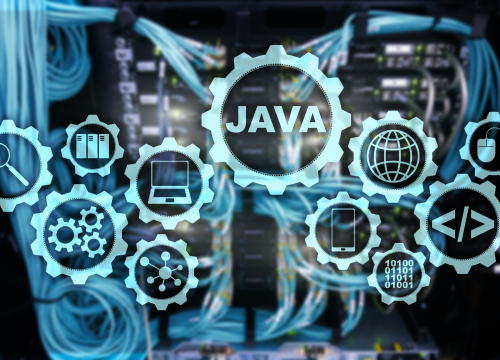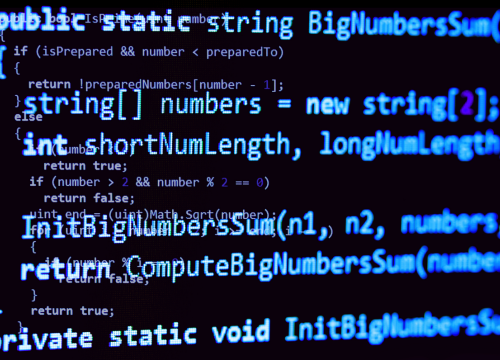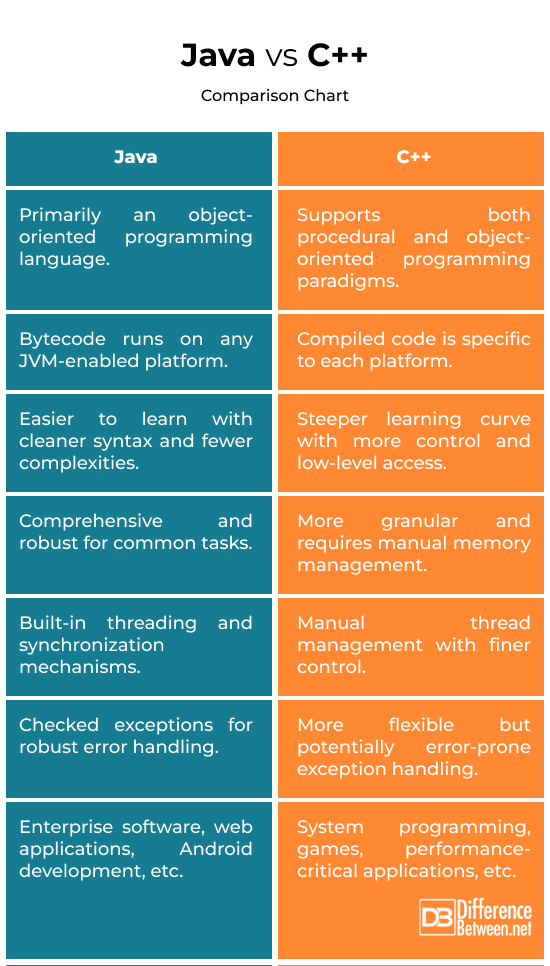Difference Between Java and C++
Java and C++ are two of the most powerful and widely used programming languages in the world. They belong to the family of high-level, object-oriented languages, designed to provide developers with a robust and versatile set of tools for building a variety of applications. Although Java and C++ share some similarities in syntax and data types, they are very different programming languages.
In this article, we’ll briefly talk about the two and discuss some fundamental differences between Java and C++. Read on to learn more.

Java
Java is a platform-independent language known for its “write once, run anywhere” philosophy, meaning it can run on any device with a Java Virtual Machine (JVM). This makes Java highly portable and suitable for a wide range of applications. Java was developed by Sun Microsystems (now owned by Oracle).
It is commonly used in web development, enterprise applications, mobile app development (particularly on Android), and large-scale systems. Java’s syntax is designed to be easy to read and write, facilitating quicker development. Additionally, its automatic memory management through garbage collection helps simplify memory handling for developers.

C++
C++ is a powerful, high-performance programming language that extends the capabilities of the C programming language. It was created by Bjarne Stroustrup and first appeared in 1985. C++ is known for its efficiency, flexibility, and object-oriented programming features. It’s an object-oriented programming language that allows developers to create classes and objects to organize and structure code.
Like C, C++ allows low-level memory manipulation, making it suitable for systems programming and tasks that require fine control over hardware resources. It is often chosen for applications where performance is critical, such as game development, real-time systems, and resource-intensive applications.
Difference between Java and C++
Platform Independence
Java is designed to be platform-independent and follows the “write once, run anywhere” principle. Java code is compiled into bytecode, which can be executed on any device with a Java Virtual Machine (JVM). In contrast, C++ code needs to be compiled separately for each target platform. While this allows for platform-specific optimizations, it lacks the cross-platform portability of Java.
Memory Management
Java uses automatic memory management through garbage collection. Developers don’t need to explicitly allocate or deallocate memory; the JVM takes care of memory cleanup. C++, on the contrary, allows manual memory management, giving developers more control over memory allocation and deallocation. While this flexibility can be powerful, it also requires careful handling to avoid memory leaks and errors.
Programming Paradigm
Java is primarily an object-oriented programming language, which emphasizes the use of classes and objects. It encourages encapsulation, inheritance, and polymorphism. C++ supports both procedural and object-oriented programming paradigms. Developers can choose to write code using classes and objects or opt for a more procedural style.
Syntax and Features
Java has a simpler syntax and is designed to be more readable. It includes features like automatic garbage collection, which simplifies memory management, and a standardized set of libraries. C++ syntax can be more complex and allows low-level operations, making it suitable for performance-critical applications. C++ also includes features like pointers and manual memory management, offering more direct control over system resources.
Exception Handling
Java uses exception handling extensively to manage errors and unexpected situations. The language enforces the use of try-catch blocks for handling exceptions to promote robust error handling practices. C++ also supports exception handling but is not as strictly enforced. Developers have the option to use or ignore exception handling mechanisms. This provides more flexibility but may also lead to less consistent error management practices.
Java vs. C++: Comparison Chart

Summary
In a nutshell, Java offers ease of use and portability, while C++ grants finer control and ultimate performance. Both languages have a rich set of libraries and frameworks, empowering developers to streamline their coding processes. While Java emphasizes platform independence and ease of use, C++ prioritizes performance and system-level control. Understanding the strengths and use cases of each language helps you choose the right tool for the job.
FAQs
What is the main difference between Java and C++?
Java bytecode runs on a virtual machine (JVM), making it platform-independent. C++ code runs directly on hardware, making it faster but platform-dependent.
Which is better to learn, Java or C++?
Java is easier to learn, with simpler syntax and automatic memory management. C++, however, is more challenging due to manual memory management, complex syntax, and powerful but intricate features.
What is C++ used for in real life?
Real-life use cases of C++:
- System programming: Operating systems, device drivers, embedded systems.
- High-performance computing: Game engines, simulations, graphics.
- Financial applications: Trading systems, risk analysis, etc.
Which is the hardest programming language?
It depends on individual learning style and background. Generally, C++ is considered harder due to its complexity and lower-level nature.
Why do people use Java instead of C++?
Java is preferred for enterprise applications, web development, and Android development, if ease of use and platform independence are priorities. C++ is preferred for system programming and high-performance applications, where fine-grained control and efficiency are crucial.
Is Python the same as Java?
Python is used for scripting, data science, and automation, while Java is ideal for building large-scale, object-oriented applications.
Which is better, Python or Java?
Python is generally considered easier due to its simplicity and flexibility.
What’s harder, Java or C++?
C++ has a more complex syntax with features like pointers, operator overloading, and macros that can be confusing for newcomers. Java’s syntax is more straightforward and similar to that of other popular languages. So, C++ is generally considered harder for most beginners.
Is Java easy or Python?
Python is considered easier to learn and use, especially for beginners.
- Difference Between Caucus and Primary - June 18, 2024
- Difference Between PPO and POS - May 30, 2024
- Difference Between RFID and NFC - May 28, 2024
Search DifferenceBetween.net :
 Email This Post
: If you like this article or our site. Please spread the word. Share it with your friends/family.
Email This Post
: If you like this article or our site. Please spread the word. Share it with your friends/family.
1 Comment
Trackbacks
Leave a Response
References :
[0]Vasappanavara, Ramesh. Object Oriented Programming Using C++ and Java. Pearson Education India, 2011.
[1]Tran, Trung. “Java Vs. C++: Which Object-oriented Programming Language Is Best for Your Project?” Orient Software, 21 Aug. 2023, www.orientsoftware.com/blog/java-vs-c-plus-plus/.
[2]Stroustrup, Bjarne. The C++ Programming Language. Pearson Education India, 2000.
[3]Burd, Barry. Java for Dummies. John Wiley & Sons, 2017.
[4]Image credit: https://www.canva.com/photos/MADV-btY8IA-java-programming-concept-virtual-machine-on-server-room-background-/
[5]Image credit: https://www.canva.com/photos/MADCRVM0CYc-programming-code-blue-color-written-in-c-language-syntax/

